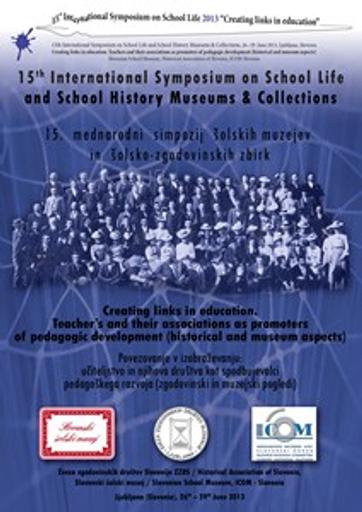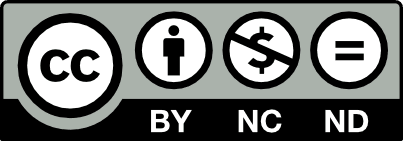/
Dogodki
/
Konference
Teachers during National Socialism and the ideologization of school education. The development of a student-hands-on-learning laboratory of humanities researches in the Nuremberg Schoolmuseum.

Avtor(ji):Mathias Rösch
Soavtor(ji):Baard Olav Skogrand (mod.)
Leto:2013
Založnik(i):Slovenski šolski muzej, Ljubljana, Zveza zgodovinskih društev Slovenije, Ljubljana, ICOM Slovenija, Celje, Inštitut za novejšo zgodovino, Ljubljana
Jezik(i):angleščina
Vrst(e) gradiva:video
Avtorske pravice:

To delo avtorja Mathias Rösch je ponujeno pod Creative Commons Priznanje avtorstva-Nekomercialno-Brez predelav 4.0 Mednarodna
Datoteke (1)
Opis
The objective of the contribution is to present a specific approach to this human science learning
laboratory for pupils and show how it intends to convey understanding and knowledge to the pupils. The self study-laboratory is focussing on teachers and their influence on everything that happened within the classroom
between 1933 and 1945. In Germany those laboratories were called “Lernlabor”.
For schools, the unique advantage of those Lernlabore is the very appealing self-determination of
research on original historical documents. Oral instructions and directives will be replaced by the opportunity to
observe, analyze, develop and reflect hypotheses by themselves. The interest in historical topics will be brought
forward just as source competencies, the ability to shift in perspective, to think and argue rationally, and of
course the ability to observe will be improved. In comparison to the Lernlabore of natural sciences strongly
expanding at schools and museums in recent years, the Lernlabor of humanities research science and its
repertoire of methods are still in their infancy. Currently throughout Germany there are only institutions of that
kind in Bochum, Berlin, Hannover and Hamburg, all of which are connected with Universities.
Together with expert didacticians, researchers, teachers and pupils the Nuremberg Schoolmuseum is
going to develop a humanities-based Lernlabor. On a surface of some 300 square metres the Lernlabor will be
designed for pupils from 9th to 12th grade, and opened in the autumn of 2014.
Pupils will be enabled to work with original historic exercise books, wall maps, and other school objects
and they also will get the opportunity to examine and work with documents about the denazification of a
Nuremberg teacher. Two questions will be in the focus of their research: On the one hand having a look into the
spread of the ideology within school and on the other hand learning how historical sources have to be
contextualized and interpreted critically for getting the most accurate reconstruction of reality in the historical
event.
Metapodatki (12)
- identifikatorhttps://hdl.handle.net/11686/37673
- naslov
- Teachers during National Socialism and the ideologization of school education. The development of a student-hands-on-learning laboratory of humanities researches in the Nuremberg Schoolmuseum.
- Lehrkräfte im Nationalsozialismus und die Ideologisierung des Unterrichts. Zur Entwicklung eines geisteswissenschaftlichen Schüler-Lernlabors im Schulmuseum Nürnberg
- ustvarjalec
- Mathias Rösch
- soavtor
- Baard Olav Skogrand (mod.)
- predmet
- zgodovina
- šolstvo
- muzej
- history
- school system
- museum
- opis
- The objective of the contribution is to present a specific approach to this human science learning laboratory for pupils and show how it intends to convey understanding and knowledge to the pupils. The self study-laboratory is focussing on teachers and their influence on everything that happened within the classroom between 1933 and 1945. In Germany those laboratories were called “Lernlabor”. For schools, the unique advantage of those Lernlabore is the very appealing self-determination of research on original historical documents. Oral instructions and directives will be replaced by the opportunity to observe, analyze, develop and reflect hypotheses by themselves. The interest in historical topics will be brought forward just as source competencies, the ability to shift in perspective, to think and argue rationally, and of course the ability to observe will be improved. In comparison to the Lernlabore of natural sciences strongly expanding at schools and museums in recent years, the Lernlabor of humanities research science and its repertoire of methods are still in their infancy. Currently throughout Germany there are only institutions of that kind in Bochum, Berlin, Hannover and Hamburg, all of which are connected with Universities. Together with expert didacticians, researchers, teachers and pupils the Nuremberg Schoolmuseum is going to develop a humanities-based Lernlabor. On a surface of some 300 square metres the Lernlabor will be designed for pupils from 9th to 12th grade, and opened in the autumn of 2014. Pupils will be enabled to work with original historic exercise books, wall maps, and other school objects and they also will get the opportunity to examine and work with documents about the denazification of a Nuremberg teacher. Two questions will be in the focus of their research: On the one hand having a look into the spread of the ideology within school and on the other hand learning how historical sources have to be contextualized and interpreted critically for getting the most accurate reconstruction of reality in the historical event.
- Ziel des Beitrags ist es, die spezifische Vermittlungsarbeit eines geisteswissenschaftlichen Lernlabors vorzustellen. Im Mittelpunkt des Lernlabors stehen die Lehrkraft und ihr Einfluss auf das Unterrichtsgeschehen in den Jahren 1933 bis 1945 in den Fächern Deutsch und Biologie. Lernlabore beziehen ihren besonderen Nutzen für den Schulunterricht aus der für Schüler sehr attraktiven selbstbestimmten Forschungsarbeit an historischen Originalen. An Stelle mündlich übermittelter Vorgaben sollen Lernarrangements das selbständige Beobachten, Untersuchen, Entwickeln und Reflektieren von Hypothesen ermöglichen. Gefördert werden dadurch das Interesse an historischen Themen aber auch Quellenkompetenz, Perspektivwechsel, rationales Argumentieren und Denken sowie Beobachtungskompetenz. Im Gegensatz zu den naturwissenschaftlichen Lernlaboren, die im Schulbereich seit einigen Jahren eine starke Expansion erfahren, steckt das Methodenrepertoire der geisteswissenschaftlichen Lernlabore noch im Anfangsstadium. Gegenwärtig gibt es im Bundesgebiet nur in Bochum, Berlin, Hannover und Hamburg entsprechende Einrichtungen, die sämtliche mit den jeweiligen Universitäten verknüpft sind. Das Schulmuseum Nürnberg entwickelt derzeit in Zusammenarbeit mit Fachdidaktikern, Wissenschaftlern, Lehrkräften und Schülerinnen und Schülern ein geisteswissenschaftliches Lernlabor auf rund 300 m2 für die Jahrgangsstufen 9 bis 12. Die Eröffnung ist für 2014 geplant. Im Lernlabor wird mit originalen Schulheften, Schulwandbildern, Zeitzeugenberichten und den Entnazifizierungsunterlagen zu einer Nürnberger Lehrkraft gearbeitet. Dabei stehen zwei Fragestellungen im Mittelpunkt: Zum einen geht es um die Möglichkeiten und Grenzen der ideologischen Durchdringung des Unterrichts. Zum anderen sollen die Schülerinnen und Schüler lernen, wie historische Quellen kritisch kontextualisiert und interpretiert werden können bzw. müssen um eine möglichst treffsichere Rekonstruktion des realen historischen Geschehens zu ermöglichen.
- založnik
- Slovenski šolski muzej
- Zveza zgodovinskih društev Slovenije
- ICOM Slovenija
- Inštitut za novejšo zgodovino
- datum
- 2013
- 27. 06. 2013
- tip
- video
- jezik
- Angleščina
- jeDelOd
- pravice
- licenca: ccByNcNd
